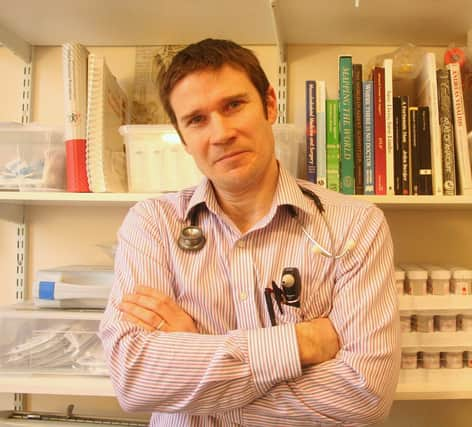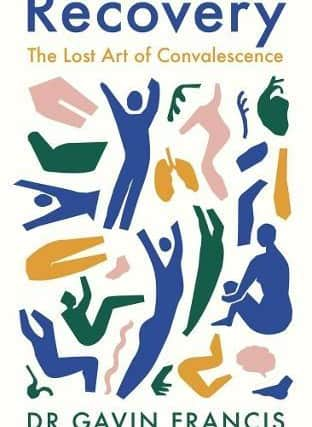Book review: Recovery: The Lost Art of Convalescence, by Gavin Francis


As I have mentioned before, I was taken gravely ill a year ago; so unwell that I only later learned that my family had been told that without surgery I would not have lived to Christmas. I am grateful each day to the medical staff that I even have a next day. It was an experience I characterise as “interesting in retrospect”, since it was the first time I was in intensive care and hospitalised. But that is only the beginning of the story.
Gavin Francis has written excellent books on the specifics of the human body – Adventures In Human Being, for example – and recently on the pandemic with Intensive Care. This new book could not be more timely, as it deals with the other side of illness. It is brief, useful and written with his customary blend of case study and literary precedent. As he states at the outset, “The medicine I was trained in often assumes that once a crisis has passed, the body and mind find ways to heal themselves – there’s almost nothing more to be said on the matter. But after nearly twenty years as a GP I’ve often found that the reverse is true: guidance and encouragement can be indispensable. Odd as it seems, my patients often need to be granted permission to take the time to recover that they need”.
Advertisement
Hide AdI can certainly affirm this. When I was discharged I was very solemnly told that I would take at least eight weeks to recuperate and I said “alright” and thought “aye, right, I’ll be dandy in a fortnight”. It seems the experts were correct. The physiotherapy was boring, the combination of frailty and lockdown was infuriating (I weighed less that eight and a half stone on leaving hospital) and I was perpetually short-tempered. When one relative phoned and said “So, you’re 100 per cent now?” I snapped back “I was never 100 per cent before”.


My sarcasm had a serious point. As Francis shows here, there is no definite boundary between being sick and being healthy. Often, a clear diagnosis – such as “that leg is broken” – does not map neatly onto recuperation, with loss of musculature, depression and frankly, a sense of having let everyone down concomitant once the cast is cast off. There is also a deep psychological returning: in a strange way I missed hospital because there I was being cared for, although my family say it was actually that I was loving being the centre of attention. Afterwards, every normal tic of the body, from a burp to a stubbed toe, is read as a sign of recurrence.
So how do we recover? In some ways this book is a statement of the obvious. “Space, light, cleanliness, greenery, quiet”, as he writes, is a good start. Indeed, there is good scientific evidence that hospitals where you can see a patient can see a tree need fewer analgesics or pain relief. Manage expectations. If you feel the need to, change a routine; but balance deciding that you will do 5k a day with your body’s insistence otherwise. All of this is good, practical advice. Where the book really shines is on the nature of being in medicine or care, and the sense that it is, in a nice simile, more akin to gardening than to being a mechanic. Sometimes different practitioners are better with different people.
There is a political dimension to this, as Francis recounts the cases where the cause of the illness is nothing a doctor can really treat. Poverty has no prescription, and encouraging things such as men’s sheds, yoga, tango classes, joining a choir and having a pet or a holiday or even reading is all well and good, but the money has to come from somewhere. Politicians of late have been fulsome about how much they admire those who work in health services and notably reticent about hands in pockets to find engaged ways to stave off illness as much as recover from it. That there is still no parity between physical and mental health work is an ongoing disgrace. My grandfather had many physical health problems but what blighted life for him was hypochondria and the fear of illness itself. I must have been a nightmare in hospital because I badgered the nurses asking for explanations as to what my blood pressure meant, what that pill does, what should my oxygen be at, what is a volvulus of the intestine and suchlike. The distance between specific medical language and lived experience can be a daunting chasm.
There is something curious about this book in that Francis writes that “accepting that different stories are even possible, and can be rewritten, is a powerful step in the right direction”. But he admits that there is no happy ending – not ever. Even when I was most whacked out of my gourd on medication in the hospital, I was never so delusional as to believe myself immortal. In some ways, philosophy ought to be offered. Given death is non-negotiable, how do we live?
Even if you are not at present ill, it is worth reading this book because the gentle guidance it gives is actually applicable to being healthy. There are things we can do that make life, even a life without pain or fatigue or anxiety, richer.
Advertisement
Hide AdRecovery: The Lost Art Of Convalescence, by Gavin Francis, Profile / Wellcome Collection, £4.99
A message from the Editor:
Thank you for reading this article. We're more reliant on your support than ever as the shift in consumer habits brought about by coronavirus impacts our advertisers.
If you haven't already, please consider supporting our trusted, fact-checked journalism by taking out a digital subscription at https://www.scotsman.com/subscriptions